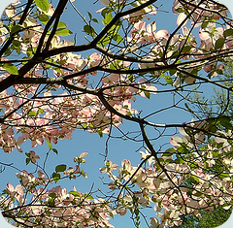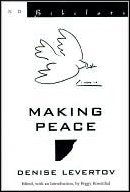Spring 2008
Table of Contents - Vol. IV, No. 1
Poetry Essays Fiction Book Reviews
Denise Levertov,
Making Peace, New Directions, 2006,
Softcover, ISBN 0-8112-1640-3, 64 pp., $9.00.
In this
important little collection, Ms. Levertov says much that is profound in a few short words. I
purchased a copy of the book on a late Sunday April morning at Border’s off Ridge Avenue, Lutherville. I was on my way to the Poetry Extravaganza at rival Barnes and Noble in Bel Air sponsored by Alan Reese and the Harford Poetry and Literary Society. The day was gently damp but blossom-filled with daffodils, magnolia, cherry trees and tulips all in bright display—while in the Mideast the U.S.-involved wars in Afghanistan and Iraq continued to rage. I had just given a history talk on Jews in the War of 1812 at Beth Israel Synagogue in Owings Mills, and it seemed appropriate somehow to add this book to the haul I got of CD’s and books from the Borders gift card my wife Donna had given me for my birthday.
Ms. Levertov, born Jewish, and I, a gentile, have in common that we both made the journey from British subject to American citizen. I arrived at the time of the Vietnam War in 1968, to go to college in Baltimore. This was around the time that Ms. Levertov (1923–1997) first started to take a stand in her poetry against the sufferings and excesses that war inevitably causes. Even up to the mid-Sixties, she had remained cautious about making political statements in her poetry, as discussed by Peggy Rosenthal in the introduction to this volume. This was to change dramatically with the publication of her poem “Life at War” in
Poetry magazine in June 1966. And here we publish an excerpt from this fine, lengthy work: a poem in which she almost lulls the reader into a sense of security with lilting beautiful word sounds
that describe the beautiful of life and man's genius but that she then wrenches away with startling and gruesome imagery, bringing home the truth of the horror of war:
. . . the knowledge that humankind,
delicate Man, whose flesh
responds to a caress, whose eyes
are flowers that perceive the stars,
whose music excels the music of birds,
whose laughter matches the laughter of dogs,
whose understanding manifests designs
fairer than the spider’s most intricate web,
still turns without surprise, with mere regret
to the scheduled breaking open of breasts whose milk
runs out over the entrails of still-alive babies,
transformation of witnessing eyes to pulp-fragments,
implosion of skinned penises into carcass-gulleys. . . .
Yes, this is the knowledge that jostles for space
in our bodies along with all we
go on knowing of joy, of love;
our nerve filaments twitch with its presence
day and night,
nothing we say has not the husky phlegm of it in the saying,
nothing we do has the quickness, the sureness,
the deep intelligence living at peace would have.
“Wow” is all that I can say: Levertov captures the idea of war among life, the notion of atrocities in everyday life. No wonder this poem has been much anthologized.
From then to the end of her life, over 30 years, many of her poems were poems of protest against war, as in the following example that I chose to read that spring day in Bel Air:
They speak of the art of war,
but the arts
draw their light from the soul’s well,
and warfare
dries up the soul and draws its power
from a dark and burning wasteland.
When Leonardo
set his genius to devising
machines of destruction he was not
acting in the service of art,
he was suspending
the life of art
over an abyss,
as if one were to hold
a living child out of an airplane window
at thirty thousand feet.
Another stunning poem by Ms. Levertov in a volume that I highly recommend as being relevant to us today as to all humankind at any time.
Brian Strand, PHANEROS: A Selection of Lanternes, Published by the Author, 24 pp., card covers, £5.00 or $10.00 US postpaid. Available from the author by email enquiry.
Buckinghamshire, England-based Brian Strand continues his journey into various poetic forms. Mr. Strand explains the lanterne form as follows: “The lanterne has been described as a ‘half American cinquain’ ie, a five line verse with 11 instead of 22 syllables in the sequence 1:2:3:4:1. Often it has an integral title which can form a ‘sixth’ line. . . . This truly versatile poetic format deserves its place amongst the five line image forms derived from our English culture.”
Mr. Strand quickly gives us a striking example of a lanterne:
The
poem
of my heart—
a lanterne of light.
Other examples of single and double lanternes in the slim book continue to delight, entertain, and enlighten about natural phenomena, the weather, and nature, viz:
DaystarDawn
tinges
the bleak sky—
hope enlightens
all.
Short Lived
‘neath
weeping
willow oaks—
drifts of bluebells
bide
Equinox
Lost
in the
soft mist of
dawn
rain
dropped leaves
spotted gold
mould in the
dew.
A pleasant and interesting volume by the prolific Mr. Strand. Recommended either for poets who wish to continue to expand their poetic boundaries or else just plain lovers of poetry.
© Christopher T. George

